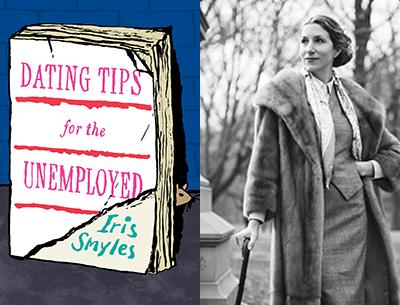A Misanthrope of the People

“Dating Tips
for the Unemployed”
By Iris Smyles
Houghton Mifflin Harcourt
Mariner Books, $15.95
Iris Smyles’s new book is a hybrid work, a mix of autobiographical fiction and humor writing that builds a witty, of-a-certain-moment novel. With an unpredictable blend of the confessional and the satirical, the absurdist and the heartfelt, Ms. Smyles chronicles the ins and outs and overnights of a 21st-century single writer-about-town who dwells in the country of her 30s, between youth and midlife.
The novel is constructed of short pieces interspersed with pages of print advertisements for goods and services in the zany/perverse/outlandish categories. The ads are complete with nifty retro graphic design and copy (some of it very involved) that encompasses whimsy, satire, and rollicking social commentary. It’s worth it to read the tiny print. A favorite: Brain Botox (with a before and after photo). “Embarrassed by unsightly brain wrinkles? Tired of your brain revealing your age?” The ads are a kind of schizoid map to the topics and themes of the book, including sex, destructive drinking, vanity, folly, loneliness, uncertainty, self-invention, and survival.
Related:
National Blurb Contest Winner Announced
The book centers around a fictionalized Iris Smyles character (whose name is Iris Smyles) with a voice that lives and finds traction through a host of tensions and contradictions. These emerge mainly in her dealings with and observations of a revolving door of boyfriends, overnight partners, and love interests. Iris is quick to fall in love but never really bonds; she is self-aware but also self-involved; she is engaged in the swim of life but terribly lonely — to be pitied for her alarming self-imposed isolation but envied for her verve and talent. She is both introvert and extrovert, and more particularly, she is eager yet misanthropic.
On the topic of a relationship that is starting to go down the tubes: “I’ve begun to really dread our conversations and so, in the interest of preserving our relationship, I’ve started to avoid him. I won’t answer the phone when he calls. Or else, I try to call him when I know he’ll be unavailable, or when I’m about to get on a train, forcing me to end the call quickly.”
At one point in the book, Ms. Smyles has her Iris character musing on the utility of a “friend registry” that “would simplify our social lives once and for all, making it easy and convenient to maintain our most cherished relationships with none of the bother of face-to-face meetings. Instead, if we wish to continue our friendship with Bob or Jenn, we just sign up for the automatic payment plan.”
Ms. Smyles is a misanthrope-of-the-people, a standout on the order of Fran Lebowitz, the late-20th-century queen of taking a bite out of tolerating others. The two humor writers even riff on the same quote originating from Eleanor Roosevelt. Ms. Lebowitz famously quipped, “Great people talk about ideas, average people talk about things, and small people talk about wine” (“Social Studies,” 1981). Ms. Smyles is willing to look directly into the void: “Brilliant people talk about ideas. Average people talk about events. And stupid people talk about people. Eleanor Roosevelt said that. What kind of people talk about nothing?”
At the beginning of the novel, Ms. Smyles orients the work in terms of Homer’s “The Odyssey”: “Spanning ten glorious, miserable, lusty, drunken, mistake-filled years in its hero’s life, ‘The Odyssey’ is a catalog of ill-fated romances, parties, daydreams, grief, feats of daring, and experiences that very often lead to nothing but the next one. It’s a lot like those first, lost, adventuring years when you’re just starting out in the world.”
Even if you don’t feel that way about “The Odyssey,” and even if Ms. Smyles’s effort appears to be going nowhere, keep reading. Okay, yes, it might flag a little in the middle, especially if the bookmark falls out and you lose track of which love interest is in play. But this novel is not desultory. There is change that implies direction, brave movement, namely a tack away from the self-destructive mode of Iris’s deeper youth. Reader: She quits drinking.
Ms. Smyles’s approach to this struggle is subtle. She declines to make a big showy thing out of it, or to cook up her quit as a centerpiece. Instead she’s chosen to let the reader experience a sea change in the last section of the novel, a shift toward the earnest and thoughtful. This works beautifully.
In indignant conversation with one of her brothers, Iris identifies herself as a “twixter,” a little too young to belong to Generation X and a tad too old to be a millennial. “Dating Tips for the Unemployed” is not a coming of age book, but it is firmly of an age — of a long moment between youth and midlife, when the thrill has worn off but the jokes have just begun.
And more, Ms. Smyles’s work marks the timeline, stakes out a place here, in the beginning of the 21st century, where self as topic is ever intricately faceted; self-exposure and self-invention proliferate in print, digital, and social media, and selfhood is a meta concept in both the examined and unexamined life. Maybe Iris Smyles is the Voice of a Generation. Maybe it’s that in-between, not quite defined, twixter one she mentioned.
Ms. Smyles would be the ideal person to come up with an ad announcing an opportunity to snag the title. Become the Voice of Your Generation! Speak for all with clarity and humor! Some restrictions apply.
Evan Harris is the author of “The Art of Quitting.” She lives in East Hampton with her husband and two sons.
Iris Smyles, a writer in residence at Guild Hall this spring, is a renter in East Hampton through the fall.
